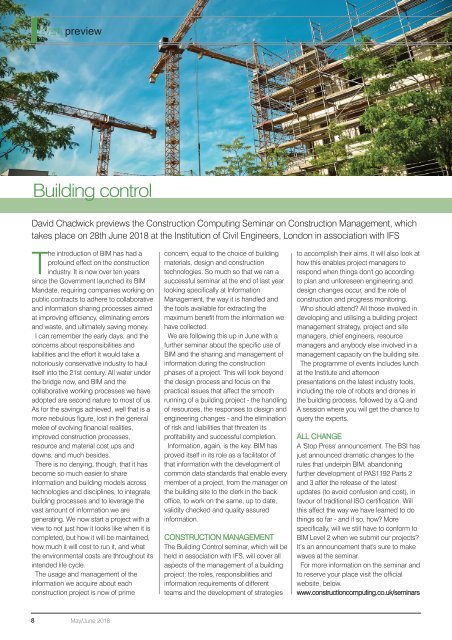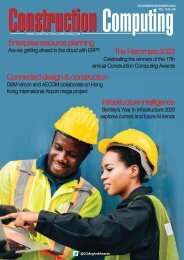CU1805
Create successful ePaper yourself
Turn your PDF publications into a flip-book with our unique Google optimized e-Paper software.
EVENTpreview<br />
Building control<br />
David Chadwick previews the Construction Computing Seminar on Construction Management, which<br />
takes place on 28th June 2018 at the Institution of Civil Engineers, London in association with IFS<br />
The introduction of BIM has had a<br />
profound effect on the construction<br />
industry. It is now over ten years<br />
since the Government launched its BIM<br />
Mandate, requiring companies working on<br />
public contracts to adhere to collaborative<br />
and information sharing processes aimed<br />
at improving efficiency, eliminating errors<br />
and waste, and ultimately saving money.<br />
I can remember the early days, and the<br />
concerns about responsibilities and<br />
liabilities and the effort it would take a<br />
notoriously conservative industry to haul<br />
itself into the 21st century. All water under<br />
the bridge now, and BIM and the<br />
collaborative working processes we have<br />
adopted are second nature to most of us.<br />
As for the savings achieved, well that is a<br />
more nebulous figure, lost in the general<br />
melee of evolving financial realities,<br />
improved construction processes,<br />
resource and material cost ups and<br />
downs, and much besides.<br />
There is no denying, though, that it has<br />
become so much easier to share<br />
information and building models across<br />
technologies and disciplines, to integrate<br />
building processes and to leverage the<br />
vast amount of information we are<br />
generating. We now start a project with a<br />
view to not just how it looks like when it is<br />
completed, but how it will be maintained,<br />
how much it will cost to run it, and what<br />
the environmental costs are throughout its<br />
intended life cycle.<br />
The usage and management of the<br />
information we acquire about each<br />
construction project is now of prime<br />
concern, equal to the choice of building<br />
materials, design and construction<br />
technologies. So much so that we ran a<br />
successful seminar at the end of last year<br />
looking specifically at Information<br />
Management, the way it is handled and<br />
the tools available for extracting the<br />
maximum benefit from the information we<br />
have collected.<br />
We are following this up in June with a<br />
further seminar about the specific use of<br />
BIM and the sharing and management of<br />
information during the construction<br />
phases of a project. This will look beyond<br />
the design process and focus on the<br />
practical issues that affect the smooth<br />
running of a building project - the handling<br />
of resources, the responses to design and<br />
engineering changes - and the elimination<br />
of risk and liabilities that threaten its<br />
profitability and successful completion.<br />
Information, again, is the key. BIM has<br />
proved itself in its role as a facilitator of<br />
that information with the development of<br />
common data standards that enable every<br />
member of a project, from the manager on<br />
the building site to the clerk in the back<br />
office, to work on the same, up to date,<br />
validity checked and quality assured<br />
information.<br />
CONSTRUCTION MANAGEMENT<br />
The Building Control seminar, which will be<br />
held in association with IFS, will cover all<br />
aspects of the management of a building<br />
project: the roles, responsibilities and<br />
information requirements of different<br />
teams and the development of strategies<br />
to accomplish their aims. It will also look at<br />
how this enables project managers to<br />
respond when things don't go according<br />
to plan and unforeseen engineering and<br />
design changes occur, and the role of<br />
construction and progress monitoring.<br />
Who should attend? All those involved in<br />
developing and utilising a building project<br />
management strategy, project and site<br />
managers, chief engineers, resource<br />
managers and anybody else involved in a<br />
management capacity on the building site.<br />
The programme of events includes lunch<br />
at the Institute and afternoon<br />
presentations on the latest industry tools,<br />
including the role of robots and drones in<br />
the building process, followed by a Q and<br />
A session where you will get the chance to<br />
query the experts.<br />
ALL CHANGE<br />
A 'Stop Press' announcement. The BSI has<br />
just announced dramatic changes to the<br />
rules that underpin BIM, abandoning<br />
further development of PAS1192 Parts 2<br />
and 3 after the release of the latest<br />
updates (to avoid confusion and cost), in<br />
favour of traditional ISO certification. Will<br />
this affect the way we have learned to do<br />
things so far - and if so, how? More<br />
specifically, will we still have to conform to<br />
BIM Level 2 when we submit our projects?<br />
It’s an announcement that's sure to make<br />
waves at the seminar.<br />
For more information on the seminar and<br />
to reserve your place visit the official<br />
website, below.<br />
www.constructioncomputing.co.uk/seminars<br />
8<br />
May/June 2018

















